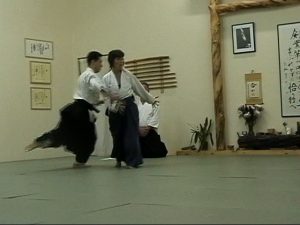For nearly 20 years I showed up on the aikido mats and practiced. We were practicing a martial art, yes, learning how to pin and throw and be pinned and be thrown. Sometimes I flew through the air and landed hard on the mats. Sometimes I softly blended my energy with my partner’s. I was learning how to move around rather than against, how to extend my energy beyond the limits of my physical body, how to wield a wooden sword or staff, and how to blend with the energy of others. And yet what I was learning most was what it meant to move from the physical center of my body, the hara.
I remember Takashi Tokunaga, my teacher at that time, would tell us to leave the dojo and do everything from this center. I remember practicing driving from center, eating from center, walking from center, playing tennis, cooking, cleaning, making love….all this from this newfound place in myself called hara. This is likely where I began to take the lessons off the aikido mat and into my life. But I did not realize at the time what an immense difference this was going to make in my life, even in my writing life.
Although hara is the physical center of the body, located about two inches below the navel, it is also much more than this. The first time I experienced this quality of “much more” related to my writing life was decades ago, right after I’d begun aikido practice. “Center” was still a clumsy concept, and yet I was able to experience the difference “center” can make. I’d been struggling with a new poem. I had that look of consternation, brows scrunched, head bowed in concentration and concern. I wasn’t getting anywhere. Then something happened that felt like “all of a sudden”. I felt my attention drop into my belly. It was as if I realized that I now had the option to hold my attention there. I remember most of all that my pen started moving on the page and I said to myself: “This is so bizarre; I am writing from my belly. I have never done this before.”
It was the moment that I knew that my care and my intelligence also lived in another part of my body besides my skull. I realized that I might trust that words could form from somewhere inside myself, such as hara, rather than that words took shape in the space between my ears. I realized in a very small way that if I sank into my own center, language could take shape in me in ways I had not yet experienced. As I imagine this now, I see that what kept me returning to one aikido dojo after another was that search for my own center to know itself and to learn how to blend with other centers. And to know more and more about this other intelligence.

Renée & Eric
I’m still learning, of course. And something else I’ve learned since that startling encounter with center is that we can actually choose to shift our attention. That we can practice our way to being able to experience what it means to shift ourselves from a reactive state of being to a creative one. And of course this affects our writing lives, but also every other encounter in our wider lives.
I recently had the joy of being in the presence of one of my favorite teachers, Wendy Palmer. She speaks of “leadership embodiment” in one of her recent books by declaring that how you sit and stand can affect the ways you think and speak. It’s not just about posture, of course, but about how we make ourselves available to ourselves and to each other. To be able to access our center through breath, through feeling our ground and how we occupy space, to sense into our length, width and depth, to feel what we care about—all this brings us to a different kind of attention. And this begins with dropping our breath into our belly, letting the belly fill and empty, feeling the plenitude that is available to us there, feeling gravity, letting ourselves be held—all this helps to get us out of our heads (which can certainly serve us well, but do not serve us completely).
So try moving from your hara. Experiment with this for a full day. Drop your attention deep inside your belly, breathe from there. Let yourself feel in your hara what you most deeply care about. Fill yourself with that care. Then begin your day—drive from center; cook from center; have difficult conversations from center; laugh from your hara; play a game of tennis from your hara—everywhere you find yourself, drop your attention to your belly.
What difference does it make?

Leave a Reply